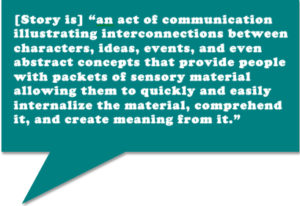See a photo of Karen, her bio, and Part 1 of this Q&A.
Q&A with Karen Dietz, Question 3 and 4:
Q: How important is it to you and your work to function within the framework of a particular definition of “story?” (i.e., What is a story?) What definition do you espouse?
A: My definition of a story, adapted from my artist friend Peggy VanPelt along with author David Hutchens, is “an act of communication illustrating interconnections between characters, ideas, events, and even abstract concepts that provide people with packets of sensory material allowing them to quickly and easily internalize the material, comprehend it, and create meaning from it.” Notice there’s no mention of story structure (beginning, middle, end) or story arc (current state, transition, problem, resolution, conclusion). That’s because stories come in all shapes and sizes. Stories, particularly in their oral telling, shift and change to fit the context, audience, intent and a whole host of other factors. So stories and storytelling is malleable. I believe oral storytelling is the most impactful. But it really depends on the context/situation as to which story structure to use, which story elements, how to work the story arc, and which media to employ. By media I mean whether it’s written, on a CD or in video format. While oral storytelling is the gold standard, for me, other media are sometimes necessary, although there are always pluses and minuses to each type of media. The questions to ask someone wanting to effectively use stories/storytelling in an organization, is “What am I trying to do? What outcome am I trying to obtain? What kind of story/stories do we need to tell and in what media in order to reach our objectives?”
Q: Are there any current uses of storytelling that repel you or that you feel are inappropriate?
A: Storytelling has immense power to both heal and harm. It bothers me to no end that as a profession, we aren’t actively discussing examples of great organizational story work, and those that are deficient or abysmal. What passes for organizational stories/storytelling in a lot of cases is just pure junk. It’s terrible. Too many people treat stories and storytelling many times as if it is trivial, instead of immensely powerful. People with no or very little training think they can effectively work with stories and storytelling in an organization, which creates only mediocre results, I’m afraid. And we rarely talk about the dark side of story — those times when stories are deliberately used to harm and destroy others.

